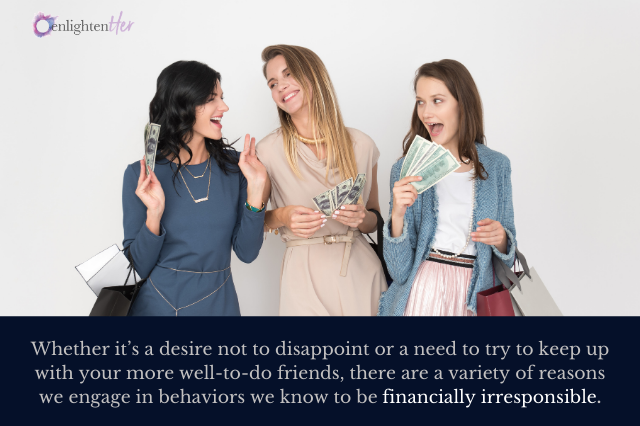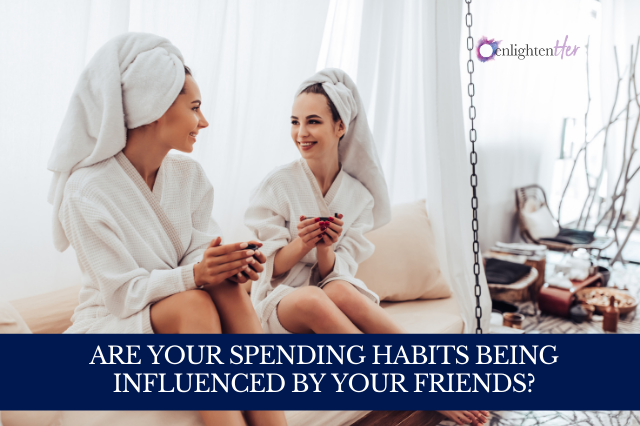Despite your best intentions, every time you hang out with Stella, you end up spending way too much money. She loves to eat at the trendiest (and often most expensive) restaurants and you almost always find yourself at the wrong financial end of her love for shopping.
How do you learn to stand your ground and tell her no?
And, why is it so hard to say no in the first place?
We’ve all encountered a friend like Stella. Someone who encourages us, prods us, or peer pressures us to make bad financial decisions. Decisions we would not normally make.
Whether it’s a desire to not disappoint or a need to try to keep up with your more well-to-do friends, there are a variety of reasons we engage in behaviors we know to be financially irresponsible.
Common ways our friends influence our spending
Keeping up
It’s totally normal to want to keep up with your friends.
In fact, psychologists explain why we do this using the theory of social comparison. This theory suggests we determine our own self-worth by comparing ourselves to others. We want our friends to think we are just as worthy as they are, so we try to keep up.
If you see your friends buying the big houses, the nice cars, and the fancy vacations, it can leave you feeling less-than and wanting more.
In an effort to keep up, we spend outside of what we can afford. Our desire to appear worthy, to see ourselves as equal or enough, can lead to unhealthy amounts of debt and other serious financial issues.
How to stop trying to keep up
- Talk to your friends. Your friends love you for who you are, not the size of your bank account. And, if this isn’t the case, then perhaps it’s time to find new friends. Be honest and tell your friends when you can’t afford something. True friends will understand. Sometimes they’ll make alternate plans, sometimes not. That’s okay. We can’t do everything and throwing our financial lives into chaos trying to keep up only makes things worse.
- Assess your values. Have you ever thought deeply as to why you want a big house or an expensive luxury car? Do your true values align with such purchases or are you being overly influenced by what your friends have? It’s easy to fall down this rabbit-hole, especially in today’s Instagram, look-at-me-and how-wonderful-my-life-is society. Take some time to assess what you value and then align your spending accordingly.
- Looks can be deceiving. Just because your friends are constantly buying new things doesn’t mean they can afford them. You see the perfectly curated picture of their vacation in Hawaii but you’re not privy to the massive credit card debt they’ve wracked up. Same is true of big houses and fancy cars. Those big houses usually come with big mortgages and it can take years, even decades for the house of cards to crumble.

The “cover me” friend
A cover me friend is always in a tight financial spot and can never pay her bill when you go out together. Every time they see the check coming, they ask, “can you cover me?” This kind of exchange can take a toll on your finances and your relationship.
While we all want to be there for our friends and help them when they’re struggling, a pattern of one-sided giving that is never reciprocated can lead to frustration, resentment, and sometimes the demise of a friendship.
How to stop covering your friends
Establish boundaries. Have an honest conversation. Tell them you can’t afford to keep paying their bill and if they can’t start paying their own way, you’ll have to stop going out with them. It won’t be a pleasant conversation to be sure, but it’s a necessary one.
Help them. Rather than continuing to give your friends money, help them to get their finances back on track. If you are financially savvy, you can give them some advice. If you’re not, then you can help them to contact a financial professional or other financial resources.

The enabler
Are you a natural spender? Are you always fighting the urge to splurge? Then be careful of the enabler.
The enabler is the friend who is always pushing you to get another drink or buy those pants you can’t afford because, “it’s been a long week and you totally deserve it.”
You feel weak around the enabler and constantly cave to peer pressure. You buy that second drink or splurge on the pair of pants because you buy into your friend’s rhetoric. You think to yourself, “I really did have a long week and, I really do deserve to treat myself.”
Our willpower is a limited resource and by the end of a long day or long week, it can be difficult to find the self-control to stick to your budget and say no. The simple suggestion from your enabler friend can help to bulldoze any remaining willpower that you may have left.
How to stop being enabled
Leave your credit card at home. If you know you will be tempted to spend too much money when you’re out with your enabler friend, make it easier on yourself. Instead of relying on willpower, leave your credit and debit cards at home and only bring the amount of cash you want to spend. It’s simple but super-effective.
Stay home. If you feel exhausted or stressed and you know your willpower and self-control are low, that’s a good sign to stay in for the night. You know yourself best. If you feel like you won’t have control over your spending, then eliminate the possibility entirely and remove yourself from the situation.

Are your friends causing you to be financially irresponsible?
While we can’t blame our friends for all (most) of our financial indiscretions, we are influenced by the people we hang out with the most — for better, or for worse.
If you find you’re constantly making poor financial decisions in the presence of certain friends, then it’s time to make a change. This doesn’t mean you have to forgo the friendship, you just need to find a different way to engage in it. There are plenty of other things you can do together that don’t sabotage your financial life.
Despite our fears, an honest conversation is usually all it takes to get on the same page. For those rare cases where it requires more, you may have to take a friend break or only plan to do things that don’t involve spending money like going for a walk or a hike. If you find you have no willpower or self-control in certain situations, then put barriers in place to limit your spending. Decide not to go out or leave your credit cards at home in an effort to behave more responsibly.
You can have a positive relationship with your spendthrift friends. You don’t judge them for their free-spending ways, right? Well, the same courtesy should be provided to you. Fortunately, that’s how it usually goes.
